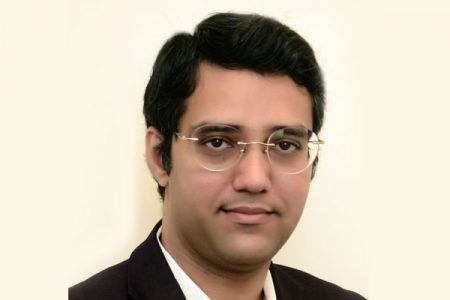Naitik Vyas, Director, Lords Mark Industries in an interaction with Express Healthcare throws light on POC market in India and explains the objective behind launching Lords Sehat health ATM
What role can Point of Care (POC) diagnostic services play in disease prevention, healthcare interventions and reducing the burden on healthcare systems?
COVID has shown us that India’s healthcare diagnostic system is not well equipped to take the burden of conducting RTPCR tests in volume and to deliver the results on time. The worst affected has been rural India where getting the results got further delayed compared to the urban centres. In such a situation time is very critical and with the invention of Point of Care kits, it becomes easier for individuals to understand the outcome even if the accuracy stands at 80 per cent-90 per cent than gold standards. Rural India, where diagnostic labs are not available, will be the greatest beneficiary of these point-of-care kits. They will get the results on time and the waiting period will be nullified. Also, these kits are helpful for mass screening in areas where the spread of any communicable disease is identified.
What’s your view on the impact of Public-Private Partnership (PPP) in expanding diagnostic coverage to underserved populations across regions?
I am a believer in the Public Private Partnership (PPP) scheme if it is in the right spirit. The government must provide equitable healthcare to the masses and with the help of private players, operations can be run smoothly and proper patient care can be delivered. Government has an infrastructure in the form of primary healthcare centres, hospitals etc, wherein private players can bring in advanced technology and operational efficiency to scale and provide affordable healthcare to the underserved population as well. Already the cost of diagnostic services is less in India compared to the global markets. For instance, a Vitamin D test at one point in time was costing Rs. 2000. But now it can be done at Rs 200.
What is the growth prospect of the Point of Care (POC) diagnostics market in India and what are the key growth drivers?
The global point-of-care diagnostics market is projected to grow from $36.37 billion in 2022 to $51.94 billion by 2029, at a CAGR of 5.2 per cent. We expect that the Indian market is also going to grow at a faster rate, especially since the central government has been pushing more on healthcare via Ayushman Bharat and the national digital health mission programme. Key drivers for this growth are people, who now actively want to check their health parameters and the government can provide access to technology and open the doors for more home-based tests. If these two things come together then growth will be exponential. The pregnancy kit is one such example, which is now being used by a large section of the Indian population.
How will ‘Lords Sehat’ ATMs address the healthcare access barriers in India?
In rural areas, the biggest challenge is having a diagnostic centre and providing immediate test results. But with Lord Sehat, it is possible to test more than 50 plus health parameters and provide instant results with gold standard devices. The health parameters that we test include glucose reading, lipid profile, haemoglobin, BMI, BMR etc. Conducting these kinds of tests doesn’t require a high-skill individual but it enhances the access to quality healthcare checkups in rural areas. Moreover, we believe that the cost of an overall health checkup which generally goes up to Rs 3000 comes down to Rs 700 – Rs 800 with the ‘Lord Sehat’ ATM. This makes the tests more affordable for the masses. We have applied for a patent for Lord Sehat.
What’s your plan for making POC diagnostic services accessible to rural and various underserved regions?
We are planning to partner with various state governments under the health initiatives and use public health centres as infrastructure to deploy Lord Sehat kiosks and train local people to handle the device which in turn will generate employment as well. We are also exploring partnerships with NGOs to sponsor Lord Sehat and we execute the test in rural areas in association with them.
Your diagnostics equipment manufacturing facility at Vasai near Mumbai will be operational soon. What’s your outlook for the company’s OEM manufacturing vertical?
In the past two years, Lord Sehat has already worked in the diagnostic sector under the brand name of LordsMed. Now that we are building our manufacturing unit in Vasai, we will be focusing more on haematology, Immunology, biochemistry, and rapid kits products. We believe in the next 3 to 5 years more pharma companies will enter the diagnostic space and we would like to be their OEM partner in providing best-in-class products at affordable rates. . We are exploring international OEM partners as well. We have signed an MOU with a Singapore-based company to manufacture products in our facility once it is ready and pass their due diligence parameters. The plant will be ISO 8, Class 100000, ISO 13485 QMS standard and WHO GMP certified.
What was the objective of launching Lords Sehat health ATM at Ambala Police Headquarters?
We have set up Lords Sehat at the Ambala Police Headquarters under the CSR initiative as a part of our tribute to the dedication and relentless efforts of the Haryana Police in maintaining law and order and ensuring the safety and security of the people. We have made preventive health checkups accessible for them as call for duty leaves them with very little time to go for regular health checkups. We have made the first 500 diagnostic tests at Lords Sehat complimentary for the Haryana police personnel. Anil Vij, Hon’ble Health Minister, Government of Haryana has recently inaugurated walk-in health kiosk along with other key dignitaries. We wish to collaborate with the Haryana government and other stakeholders to further expand the Lords Sehat network to other parts of the state.

